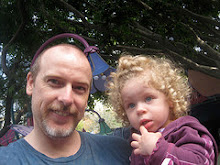I have spent a lot of time thinking of language. Stuff like, why is it that words often have sounds that literally evoke the meaning in a phonetic way.
"Hush" sounds like a soft "shhh."
"Whisper" sounds like a gentle whisper.
"Rock" sounds like a singular hard object.
And is it coincidence that "God" is so close to "good" or that "Devil" is so close to "evil"?
I sometimes see connections between words that make me thing their phonetic similarities reflect a deeper, meaningful connection that tells us that deep down -- perhaps on a subconscious level -- evolving humanity has recognized and signified a relationshp between those words (or the meanings they carry) that we may no longer consciously recognize. And if we do consciously recognize and appreciate it, we may gain some insight and wisdom about the world around us. Basically, learning about the nature of reality through hidden clues left by our ancestors in the dipthongs and sounds that evolved into our modern language.
But then I recall that there are languages where this stuff probably does not carry over. Like African language based on clicks and such, or Asian languages that sound very warbling and gurgling. What does this do to my theory that we naturally choose words that have a sound that evokes the spirit of the meaning of the word? I don't know. Alas, I am not a linguistics major, so this is like "armchair linguistic philosophy" and could be laughable to a real expert.
One thing that did occur to me, in thinking about the different kinds of languages in the world, is how language evolved to be different in different areas of the world. And it immediately struck me that language evolved as humans were making a shift from animal intelligence to human intelligence, and so on that cusp of evolution our ancestors used more and more sound to communicate ideas to help hunt, gather, wage war, whatever.
And at that time, the world was still a very untame place. People were not the "cock of the walk," but had to fear predators and such, at least in some parts of the world. So I assume one major decision made in choosing how to speak and communicate was to BLEND IN. You wanted to make sounds that predators might view as natural sounds of the trees or the rivers or the wind, not as sounds made by potential prey. So in a forest setting with crunching leaves and branches, people might use sharper, crunchier sounds for language. In a desert setting with howling winds, words might be less consonant. In a very watery place with rivers and marshes, the language might be very gurgling and soft. In a very rainy place with droplets coming down almost constantly (and even after rains, canopies of leaves hold water that drip drops for hours) language mght be more rhythmic. For similar reasons -- camoflauge, basically -- people might choose sounds that mimick other creatures with whom they live, the growl of a bear, the chirp of a bird, etc.
Now, that is only one side of the coin. The problem with using sounds that blend in is that, if they blend in, they may be hard to be heard and recognized by those you want to hear them. So there is a counterbalancing need to use sounds that will cut through the sounds of your natural world, that will be unique. The extent to which people chose sounds for camoflauge (i.e., that blended into their environment) or that stood out as unique (i.e., to better be heard and recognized) was probably affected by how predatory the environment was. People living in areas with little or no natural predators probably adopted linguistic sounds that were more unique and contrasted to the environmental sounds, while people living in areas with more predators probably chose linguistic sounds more in tune with environmental sounds.
There could also be shifts in time. People living in an area full of predators might have started out using linguistic sounds that were very camoflauged and blended in, but as their tribes and strength grew, they might have found they were kings of the land and had less fear of predators and then felt free to shift to sounds that carried better and contrasted more. So as language evolved over time, there may have been shifts in what influenced the choice of sounds and dipthongs from which to create language.
Any linguistic experts, feel free to chime in or correct me.
Ken
Subscribe to:
Post Comments (Atom)


No comments:
Post a Comment